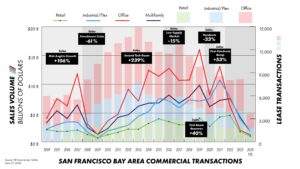Navigating Market Downturns: When Legal Expertise is Essential in Real Estate Transactions
 I started my legal career in 2009 when the subprime mortgage bubble busted. What I did then to land my very first job out of law school was cold called all USF Alumni specializing in real estate, banking and bankruptcy law. It seemed obvious then that there would be lots of legal work stemming from the foreclosure crisis, but where is the legal work today in the San Francisco Bay Area?
I started my legal career in 2009 when the subprime mortgage bubble busted. What I did then to land my very first job out of law school was cold called all USF Alumni specializing in real estate, banking and bankruptcy law. It seemed obvious then that there would be lots of legal work stemming from the foreclosure crisis, but where is the legal work today in the San Francisco Bay Area?
Just like in previous market downturns, from the dot-com bust of the early 2000s to the subprime mortgage crisis, we again find ourselves at a time when sale and lease transactions are at a low, vacancy rates continue to increase, property values decline, construction projects slowed, and credit tightened. Now that I’m on the other side of the transaction, brokering deals as a commercial real estate broker for the past four years, as opposed to reviewing and drafting legal documents, I now view this question from a different perspective.
Unsurprisingly, people are reluctant to hire attorneys unless they absolutely have to, especially when money is tight. I see so often, to the client’s detriment, the prevailing sentiment that hiring an attorney is an unnecessary cost to reduce risks that they can’t fathom, even if they have been burned in the past. It’s not just tenants that are doing this. Landlords, who have more to lose if their leases do not adequately protect them, are recycling old forms leaving out the requisite Certified Access Specialist (CASp) inspection disclosures. As brokers, our review of legal documents is very limited. We ensure that the basic terms are incorporated, and that proper disclosures are made to protect ourselves as brokers. Beyond that, it would be wise to refer clients to seek the advice of counsel, which often falls on deaf ears if the transaction is not particularly large, or the clients’ budget is very limited. Standard AIR or CAR forms are sufficient solutions for them during these times.
In order to survive in this environment, attorneys need to offer something of value beyond what the typical AIR or CAR forms provide. There is a saying that “where there are challenges, there are opportunities.” One of the ways to make transactions more attractive in this environment is to offer alternative financing like seller financing, where the sellers offer to lend all or a portion of the loan to qualifying buyers at lower interest rates than what conventional lenders can offer. Attorneys should look for listings where seller financing is offered, and ask the brokers if they can collaborate on those seller financing deals, as neither CAR nor AIR forms are sufficient for such transactions.
Business closures also present opportunities for attorneys. Before winding down their business, owners typically want to sell their business, including all of the FF&E (Furniture, Fixture & Equipment) to ensure continuity of the business that they built or to cut their losses. Their last resort is to liquidate. Selling the business will require legal expertise in the drafting of a buy sell agreement, bill of sale, and the like. If they want to close the business before the lease expires, then they need attorneys to negotiate an early lease termination. Regular meetings with business brokers and commercial real estate brokers can help attorneys identify these opportunities early.
After a space is vacated and before it can be leased or purchased, dealing with the city planning and zoning departments is another area that present opportunities for attorneys. Surprisingly, not many attorneys are open to working with the city to apply for the necessary approvals, or to interpret zoning laws or to review prior administrative decisions. The delays in getting approvals for city permits are happening throughout the United States, not just in the Bay Area. This is partly due to the bureaucratic red tape. For example, due to budget cuts, Oakland’s Planning Department is only open two days a week as of the writing of this article, and rarely return phone calls. Many cities are trying to expedite the process, but some approvals just take longer such as a CUP (Conditional Use Permit). Most business owners are not comfortable applying for a city permit alone, especially if a CUP is involved, which requires a noticed hearing before the planning department or city council, or if they are required to challenge any adverse decisions. Landlords and sellers meanwhile put pressure on tenants and buyers to start paying rent or remove their contingencies to purchase. In my opinion, familiarity with the city planning procedures and prior decisions can make attorneys invaluable through a very stressful process for all parties involved in the commercial real estate transaction.
In this market, where transactions volumes are low, specialization and networking are crucial. Becoming an indispensable part of the transaction through specialization is more important than ever before, and having the industry connections are the keys to surviving until the economy recovers.